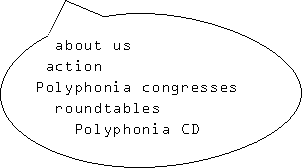
|
||

European conference in November 2001
National conferences in April and May 2001
In order to discuss and
develop the idea of Polyphonia, Radio Dreyeckland, Radio Ondarossa, Radio
Orange 94,0 and Radio Contrabanda organized conferences in their respective
countries in April and May. Representatives of other community radio stations
as well as other groups and organizations were invited to these conferences.
The Polyphonia radio stations were in agreement that above all the conferences
should be utilized to support the networking of production teams from various
community radios who focus on discrimination and to make a direct exchange
of information and contact among representatives of organizations possible.
As far as the partner radio stations were concerned each had a different thematic focus and target groups in mind. These differences were due to the varying situations of the radios in their countries, to current topics and of course to the individual priorities of the stations themselves. Radio Contrabanda, for instance, considered it particularly vital to strengthen contact between community radios and women's organizations, setting its thematic focus on the discrimination against women migrants in Spain. Radio Orange wanted to use its conference to facilitate exchange between community radios in Austria and representatives of lesbian and gay organizations there; one reason for this being the fact that Euro-Pride was to take place in Vienna in the summer of 2001. Radio Ondarossa placed the political discussion surrounding discrimination and the fight against discrimination in the forefront of its conference while Radio Dreyeckland - together with representatives of groups dealt with by Polyphonia: migrants, people with handicaps, lesbians and gay men - wished to discuss the mixed approach to talking about and fighting against discrimination.
Independent of these differences it was an aim in all of the conferences to strengthen old contacts and to create new ones. Especially for those coming from outside the radios and who had little or no experience with that medium these conferences were to initiate collaboration and cooperation among those groups in general but on a national level as well. In their own eyes the partner radio stations were in agreement that community radio represents a very good foundation for offering minorities a public platform. At the same time individual groups who are discriminated against in various forms by mainstream society have few contacts (to one another) and only rarely is there any kind of exchange among them as they are far from being organized beyond these groups. Thus a common theme in all of these conferences was how to utilize community radios to this end. On the one hand it became clear that creating just such networks would not happen quickly, but on the other hand new contacts and cooperative projects show that the conferences were successful in bringing life to the concept.
download:
conference reports
Community radios against discrimination
Polyphonia's
European Conference in Vila Real, Portugal, 23 - 25 November 2001
At a time when the role of the media in propagating stereotypes about cultures has become all too apparent, not only the responsibility of the media must be critically examined, but also the possibilities of using media in a way that guarantees autonomy and voices to the marginalised sections of our societies must be re-defined. From 23-25 November 2001, community broadcasters and social activists from different European radios and media organisations gathered in Vila Real, Portugal at a conference titled "Polyphonia: community radios against discrimination in Europe". The focus of the conference was on campaigning and programme exchange in the European community radio sector on anti-discrimination themes. The conference also sought to bring NGOs and radios in dialogue, in order that their co-operation in campaigning and public awareness work can be enhanced.
The conference included
presentations of existing models of good practice at local levels, such as
• Freiburg based Radio Dreyeckland's co-operation with gay and lesbian
groups to do awareness raising programmes in schools and for the local community.
• Barcelona's Radio Contrabanda and MigraMedia's efforts to train and
provide discussion forums for women and lesbian groups in Spain
• Roman Radio Onda Rossa's broadcasts and campaigns for people in prison
• low-cost, user-friendly Internet based campaigning strategies developed
by Viennese Radio Orange
Although community radios in Europe broadly represent similar political standpoints in issues such as racism, xenophobia and discrimination on grounds of sexuality or disability, the formal and informal discussions that took place during the conference proved that there were many controversial questions and debates as to how exactly this political commitment should be put into practice. One of the issues raised was whether it is possible to equate and find similarities between different grounds of discrimination? While some participants felt it was necessary to promote gays speaking up for migrants' rights or wheelchair drivers campaigning against the deportation of asylum seekers, since they all had common experiences, others questioned this approach and its implied notion of anti-discrimination altogether. Another issue discussed during the conference was how and in what ways new technology can be used by radios jointly, as a campaigning means. There are currently several existing models of programme exchange, audio archiving and live broadcasting in different regions of Europe, which are either language based, or thematically arranged. Participants discussed how and whether these energies could be pooled together more coherently. The differences and challenges on a European level, to achieve this aim became apparent at the conference. A working group of interested persons was set up at the conference, in order to look into the question of making technology suitable to the themes that radios seek to campaign about.
The conference, which was financially supported by the European Commission Programme on Combating Discrimination and the Universidade de Trás-os-Montes e Alto Douro within the framework of the project "Polyphonia", was hosted by Radio Universidade Marao, a university-based community radio station in Vila Real, North Portugal and organised by AMARC Europe (World Association of Community Radio Broadcasters).
5